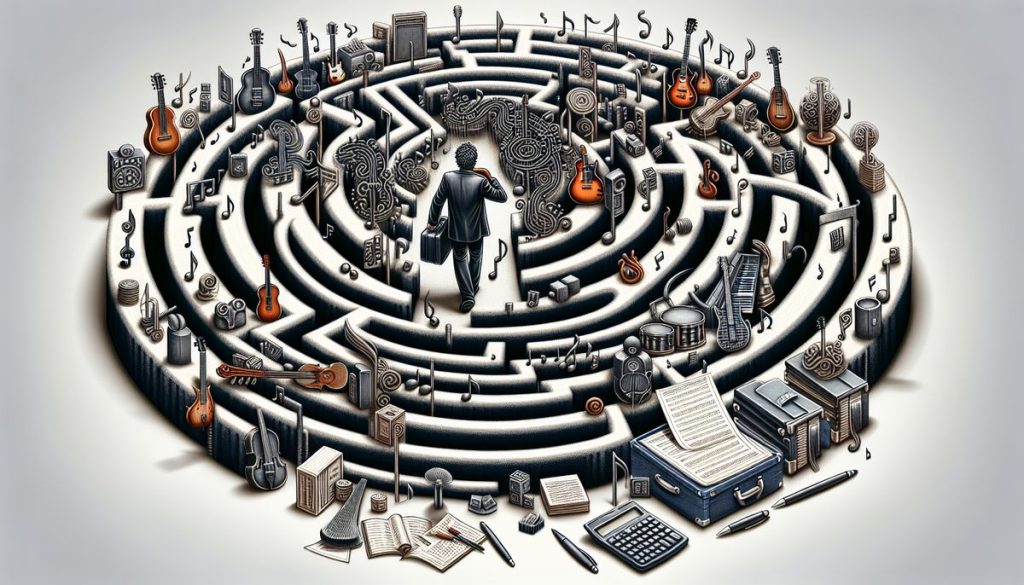Navigating the Beat: Understanding Copyright and Trademark Law for Aspiring Musicians
Written by DJ Prodigee on Tue Feb, 2024
For aspiring musicians, understanding the legalities of copyright and trademark law is as crucial as mastering scales and harmonies. Navigating the complex landscape of intellectual property rights can be daunting, but it’s essential for protecting your work and ensuring your career can flourish without legal setbacks. This article serves as a guide through the intricacies of these laws, ensuring that your creative journey strikes the right chord with both your audience and the legal standards of the music industry.
Key Takeaways
- Understanding copyright law is fundamental for musicians to protect their original works and avoid infringement.
- Trademark law is vital for safeguarding band names, logos, and merchandise, which are key to a band’s brand identity.
- Aspiring musicians must navigate monetization strategies carefully to ensure they comply with copyright and trademark laws.
- Online music sharing presents legal challenges; knowing the boundaries of copyright law is necessary to prevent piracy.
- Balancing creative expression with legal compliance is possible by staying informed and making educated decisions about intellectual property.
Copywrong or Copyright? The Musician’s Dilemma
The ABCs of Copyright Law
Alright, aspiring Mozarts and Madonnas, let’s dive into the copyright soup and make sure you don’t end up with a legal cold. Copyright law is like a secret sauce that keeps your creative burgers from being stolen right off your plate. It’s the invisible fence that tells the world, "This masterpiece is mine, and you can’t have it without saying ‘pretty please’ with a cherry on top."
But before you start slapping copyright notices on everything, including your grandma’s secret cookie recipe, let’s break it down:
- Copyright: It’s the legal right to be the only one to reproduce, distribute, or perform your work for a set period of time. Like a VIP pass to your own creativity party.
- Intellectual Property: This fancy term is just a grown-up way of saying ‘all the cool stuff you create’. It includes your tunes, your lyrics, and even that weird dance move you invented last Thursday.
Remember, not all heroes wear capes, some just have really good lawyers.
So, whether you’re remixing, rewriting, or just reveling in your own genius, understanding copyright is crucial. It’s the difference between your song being a hit on the charts or just a hit with your mom (love you, mom!).
Sampling, Covering, and Crying Over Spilt Music
Ever felt like you’re walking on a tightrope while trying to figure out the dos and don’ts of using someone else’s tunes? Welcome to the club, where the drinks are free but the copyright infringement lawsuits are not. Sampling is like a box of chocolates, you never know what you’re gonna get—legal headaches or a hit record?
Here’s a quick rundown of what’s cool and what’s gonna land you in hot water:
-
Sampling: Clear it before you rear it. Get permission, or get ready for a courtroom drama.
-
Covering: Pay the piper (aka licensing fees) to play someone else’s melody at your gig.
-
Remixing: It’s a remix, not a free pass. Twist and shout, but don’t forget to sort out the rights.
Remember, folks, Copyright and trademark law protection in the music industry is essential for musicians to safeguard their creative work and brand. Understanding and applying these laws is crucial for success in the modern music landscape.
Pro tip: Don’t just sample, innovate! Make that borrowed beat your own, and you might just avoid the legal blues.
Fair Use or Foul Play? The Thin Line
So you’ve sampled a beat that’s stickier than a melted lollipop on a vinyl seat in the middle of summer, and now you’re wondering if you’re about to get sued into next week. Fair use is like that friend who says they’ll help you move and then bails last minute – it’s tricky and not always there when you need it. But don’t fret! Here’s a quick rundown to keep you on the right side of the law:
- Transformative Use: Did you turn that 3-second clip into a post-modern symphony? You might be in the clear.
- Amount and Substantiality: If you used less of the song than it takes to sneeze, you’re probably okay. Probably.
- Effect on the Market: If the original artist can’t sell their song because everyone’s jamming to your version, you might want to lawyer up.
- Nature of the Work: If you’re sampling the Beatles, expect more scrutiny than if you’re remixing your neighbor’s garage band demo.
Remember, just because you can do something doesn’t mean you should. That’s a life lesson and a legal one.
Understanding copyright basics, fair use, and trademark protection in the modern music industry is crucial. Beware of licensing issues with sampling, merchandise, and trademarks to avoid infringement and protect creative works. And if you’re still confused, consider this your sign to consult a professional – because sometimes, the best beat is the one that doesn’t land you in court.
Trademark Tango: Dancing Around Legal Landmines
Your Band’s Name: More Than Just a Cool Tattoo
Choosing a band name is like picking a tattoo for your brain. It’s going to stick with you, and it’s how fans will remember your groovy tunes. But before you ink that name on all your merch, let’s talk about why it’s crucial to dance the legal dance.
Your band’s name is your identity. It’s the flag you wave at the battle of the bands, the chant in the crowd at your gigs. But if you’re not careful, it could also be the reason you’re handing over a fat check to some dude who thought of it first. Protect your music by understanding legal and compliance risks, securing intellectual property, and ensuring proper contracts to safeguard your future and royalties.
Here’s a quick checklist to ensure your band’s name isn’t already taken:
- Google is your friend. Start with a search and see what pops up.
- Check social media platforms. If it’s taken on Instagram, you’re going to have a bad time.
- Trademark databases are like the bouncers of band names. Make sure yours isn’t already on the VIP list.
Remember, a unique band name isn’t just about standing out. It’s about legally owning your brand and avoiding the courtroom tango.
Logo Schmogo: Protecting Your Visual Vibe
So you’ve got a logo that’s more eye-catching than a neon sign at a Las Vegas buffet. But is it protected? That’s the million-dollar question, my friend. Your band’s logo is like your flag, waving high in the sea of fans. It’s not just a doodle on a napkin—it’s your brand, baby!
- First, check if your logo is truly original. You don’t want to be ‘that band’ who accidentally ripped off the Rolling Stones’ tongue.
- Next, trademark that bad boy. It’s like putting a padlock on your bike in the city.
- Finally, enforce it. If you see your logo on some knockoff t-shirts, it’s time to unleash your inner legal eagle.
Remember, protecting your visual vibe isn’t just about keeping your art safe; it’s about ensuring your merch table isn’t confused for a flea market stall.
And hey, if you’re feeling overwhelmed, just think of it as another form of creative expression. After all, there’s nothing quite like the art of a well-crafted cease-and-desist letter.
Merch Madness: When Your Face is on a Stranger’s Chest
Imagine walking down the street and spotting a complete stranger sporting a T-shirt with your face plastered across it. It’s a mix of flattery and a ‘what the heck?’ moment. Merch can be a musician’s best friend or a bootlegger’s day job. It’s all fun and games until someone slaps your logo on a knockoff onesie and starts selling it out of their trunk at your own concert.
Merchandising is a key aspect of a musician’s brand, and it’s not just about slapping your name on a mug. It’s about creating a connection with fans that extends beyond the music. But beware, the road to merch glory is littered with legal landmines. Here’s a quick rundown of what to keep an eye on:
- Copyright Protections: Ensure your designs are covered under copyright law.
- Trademark Your Brand: This includes your band name, logos, and distinctive catchphrases.
- Quality Control: Keep an eye on the quality of merchandise being sold under your name.
- Licensing Agreements: Partner with reputable companies and understand the terms.
Remember, every piece of merch tells a story, and you want it to be a story that you’ve written, not one that’s been pirated by Captain No-Beard in the parking lot.
Making Bank Without Breaking Laws
Monetizing Music: Royalties, Rights, and Real Talk
So, you’ve got a killer track that even your grandma can’t stop humming. But before you start dreaming of swimming in a pool of cash like Scrooge McDuck, let’s talk royalties. Getting paid for your music isn’t as simple as hitting the upload button and waiting for the money to roll in. You’ve got to navigate the treacherous waters of copyright law, and that’s where things get as complicated as your relationship status.
- Understand the legal aspects of music creation.
- Learn the importance of copyrights and trademarks.
- Consult with music lawyers to avoid legal pitfalls.
- Emphasize financial literacy for emerging artists.
Remember, knowledge is power, and in the music biz, it’s also the difference between getting paid and getting played.
Now, let’s break it down. You’ve got mechanical royalties, performance royalties, sync fees, and maybe even some merch money if your face is cool enough to slap on a T-shirt. But don’t forget, with great power comes great responsibility. And by ‘power,’ I mean the power to hire a good lawyer so you don’t end up in a copyright kerfuffle.
Merchandising Mayhem: Keeping it Kosher with Your Goods
So you’ve got fans clamoring for a piece of you, and you’re ready to slap your face on everything from tees to toasters. But hold up, Picasso! Before you turn your merch table into a free-for-all bazaar, let’s talk about keeping it kosher with your goods. Merchandising is a legal minefield, and you don’t want to be the one playing catch with a lawsuit grenade.
First things first, make sure your designs aren’t stepping on any big corporate toes. That ‘Mickey Moshpit’ shirt might seem like a hoot, but Disney’s lawyers have got a sense of humor dryer than a martini at an AA meeting. Here’s a quick checklist to keep your swag on the straight and narrow:
- Originality: Is your design 100% your brainchild?
- Trademark: Have you checked for similar trademarks?
- Permission: Got all the necessary permissions and licenses?
Remember, when in doubt, reach out! It’s better to ask for permission than beg for forgiveness after your bank account has been bled dry by legal vultures.
And let’s not forget about quality. Nobody wants a t-shirt that turns into a crop top after one wash. Invest in good materials and reputable manufacturers. Your fans will thank you, and your merch will become the stuff of legend, not landfill.
Digital Dollars: Streaming and Screaming into the Void
Welcome to the wild west of the digital age, where the streams are plenty, but the dollars are elusive. Making money from streaming can feel like squeezing water from a rock—and not just any rock, but one that’s already been wrung dry by every musician with a SoundCloud account. But fear not! With a little know-how, you can turn those streams into streams of income.
Here’s the skinny on streaming revenue:
- Subscription Services: The big dogs like Spotify and Apple Music pay you a fraction of a penny per play.
- Ad-Supported Services: Think YouTube, where ads play and you get paid—just enough to buy a gumball.
- Direct Sales: Bandcamp is your friend, where fans can buy your music outright, and you keep a larger slice of the pie.
Remember, it’s not just about quantity, but quality. Engage your fans, release consistently, and keep your content top-notch.
And let’s not forget about the power of playlists. Getting on a popular playlist can be the difference between a few extra bucks and paying this month’s rent. So, polish those tracks and start schmoozing with playlist curators. It’s a tough gig, but someone’s got to do it!
The No-No’s of Online Music Sharing
Sharing Isn’t Always Caring: The Pitfalls of Piracy
Ahoy there, mateys of melody! Before you set sail on the high seas of the internet, beware the siren call of piracy. It’s not just about wearing an eye-patch and shouting ‘Arrr!’—piracy can sink your ship faster than you can say ‘Jack Robinson’. Music piracy significantly impacts the music industry by causing direct financial losses. When a piece of music is pirated, neither the artists nor the record companies see a dime, and that’s no shanty tale.
Piracy isn’t just a bad look for your karma; it’s a torpedo to the hull of the music biz.
But what does this mean for you, the aspiring musician? Well, let’s break it down:
- Financial Fiasco: Every pirated song is a coin not dropping in the piggy bank.
- Moral Mayhem: It’s like inviting yourself to a party and not bringing a snack—just rude.
- Creative Consequences: Less money means less music. It’s a vicious cycle, folks.
Remember, while sharing is caring in kindergarten, in the world of music, it’s a no-go. Stick to the straight and narrow, and let’s keep the tunes legit!
Social Media: Friend or Foe in the Copyright Jungle?
Ah, social media, the digital jungle where copyright issues lurk behind every selfie and subtweet. It’s a place where your latest track can go viral faster than you can say ‘unauthorized use.’ But fear not, intrepid musicians, for it’s also a land of opportunity—if you know how to navigate the underbrush of legalities.
Sharing your music on social media can be a double-edged sword. On one hand, platforms like Twitter and Instagram can catapult you from bedroom recordings to the Billboard charts. On the other, they can be a minefield of copyright infringement claims waiting to explode your career into a sad, sad symphony of legal woes.
Here’s a quick rundown of do’s and don’ts:
- DO: Use social media to showcase your original work and connect with fans.
- DON’T: Post copyrighted material without permission. That’s a no-no.
- DO: Understand the platform’s terms of service—ignorance isn’t bliss, it’s a lawsuit waiting to happen.
- DON’T: Assume that ‘sharing’ means ‘free for all.’ Even retweets can ruffle some legal feathers.
Remember, kids, in the wild world of the web, it’s better to be safe than sorry—or worse, sued.
Website Woes: Ensuring Your Site Sings Legally
So you’ve got a website that’s slicker than a greased saxophone, but is it hitting the right legal notes? Navigating the web’s legal sheet music is like playing a symphony on a kazoo; it’s tricky, but not impossible. Here’s a quick riff on keeping your site in tune with the law:
- The Basics: Make sure your site’s content is original or properly licensed. That includes text, images, and, of course, the sweet, sweet music.
- The Fine Print: Display your terms of use, privacy policy, and copyright notices like they’re the headliner at your gig.
- The No-Nos: Avoid using other people’s trademarks or copyrighted material without permission. It’s like stealing a guitar pick from the god of rock – just don’t.
Remember, your website is the digital face of your music. Keep it clean, keep it legal, and keep it rocking.
Lastly, don’t forget to indemnify yourself against the mosh pit of legal liabilities. A simple clause can save you from a stage dive gone wrong. And always, always, make sure your return and refund policies are as clear as the high note in your favorite solo. Because when it comes to legal woes, ignorance plays no gigs.
Staying True to Your Art Without Selling Your Soul (or Rights)
Creative Control: Balancing Art and Ownership
Let’s face it, being an artist today is like juggling chainsaws while riding a unicycle – it’s all about not losing a limb (or your soul) in the process. Emerging artists face challenges like AI-generated music and balancing creativity with profit. But hey, don’t let that scare you into playing cover gigs at your cousin’s bar mitzvah for eternity. Stay true to your vision and build a supportive fan base for success.
So, you’ve got a killer track that’s more infectious than the common cold in a kindergarten class, but how do you keep it yours? Here’s a quick rundown:
- Protect your work: Copyright it, and don’t just rely on a pinky promise from your bandmates.
- Know your rights: Understand what you can and can’t do with your music. No, you can’t just sample Beyonc\u00e9 because it’s ‘flattering’.
- Build your brand: Your music is awesome, but can people recognize it’s you? Get that logo and slap it on everything short of your grandma’s forehead.
Remember, it’s not just about making music, it’s about making sure you can still call it yours after it’s out there in the wild.
And when it comes to signing contracts, think of them as relationship prenups – they’re not romantic, but they sure can save you from a world of heartache. Read the fine print, or better yet, get someone who actually enjoys that kind of torture to read it for you.
Collaboration Conundrums: Who Owns What?
So you’ve decided to team up with another musical maestro, and together you’re making sweet, sweet tunes. But hold up! Before you start dreaming of Grammy speeches, let’s talk about who owns what in this symphony of collaboration. Collaboration is like a potluck dinner; everyone brings something to the table, but who gets to keep the leftovers?
Imagine you’re whipping up a hit song like it’s a batch of grandma’s secret recipe cookies. You’ve got the melody, your buddy’s got the beat, and someone else throws in a killer bassline. But when the dough rises and the cash starts rolling in, how do you split the cookie jar? Here’s a simple breakdown:
- Melody Maker: Gets a slice of the royalties pie.
- Beat Bringer: Also grabs a piece of the pie.
- Bassline Boss: You guessed it, another slice!
But remember, without a clear agreement, you might all end up with just crumbs.
Now, let’s sprinkle in a real-world crumb for thought. Sony Music recently sued OFRA Cosmetics and its collaborating content creators for copyright infringement. This little anecdote is a crunchy reminder that when you mix business with beats, you better have your agreements baked to perfection. Don’t let your jam session turn into a legal jam!
The Fine Print: Contracts That Don’t Make You Cry
Let’s face it, the only thing scarier than a blank page is a contract so dense it could double as a doorstop. But fear not, intrepid tune-smiths! Navigating contracts can be as smooth as your jazz solos if you know what to look for. First off, remember that recording contracts are like promises etched in legal stone, where you agree to create a record and the label agrees to make you a star—or at least try really hard.
Here’s a quick cheat sheet to keep your eyes dry while reading the fine print:
- Rights and Royalties: Who gets what and when? Make sure your future yacht isn’t just a dinghy in disguise.
- Term and Termination: How long are you hitched to this label wagon? And how do you jump off without breaking your legs?
- Creative Control: Can you keep your artistic soul, or does the label get to bedazzle your album cover?
Remember, a contract is a roadmap, not a rollercoaster. Keep your hands inside the vehicle at all times, and you’ll arrive at Successville instead of Litigation Lagoon.
And hey, if you’re feeling overwhelmed, just think of contracts as those choose-your-own-adventure books, but with more legalese and fewer dragons. So grab your quill (or, you know, a pen), and let’s make some music history—without the courtroom drama.
Conclusion: Rockin’ the Legal Riffs
Alright, you musical maestros and legal laymen, we’ve jammed through the jargon and riffed over the regulations, so it’s time to wrap up this gig. Remember, copyright and trademark laws are like the rhythm section of the music industry—they keep you grooving safely without stepping on any legal landmines. Whether you’re auctioning your tunes on eBay or just trying to avoid a courtroom mosh pit, knowing your rights is as crucial as nailing that high note in your solo. So, keep your creative act tight, your trademarks tighter, and your audience delighted. And if you ever feel lost, just think of this article as your trusty roadie, always ready to lug your intellectual property to the next show. Rock on and stay out of legal limbo, you rockstars!
Frequently Asked Questions
What are the basics of copyright law for musicians?
Copyright law protects original works of authorship, including songs and compositions. As a musician, you own the copyright to your original music from the moment of creation, provided the work is fixed in a tangible medium of expression.
Can I legally cover someone else’s song?
Yes, you can legally cover a song by obtaining a mechanical license from the copyright owner or a music licensing organization. This allows you to record and distribute your version of the song.
What constitutes fair use in music?
Fair use is a legal doctrine that permits limited use of copyrighted material without requiring permission from the rights holders. Factors include the purpose of use, nature of the copyrighted work, amount used, and effect on the work’s value.
How do I trademark my band’s name and logo?
To trademark your band’s name and logo, you need to file an application with the United States Patent and Trademark Office (USPTO). It’s important to ensure the name and logo are unique and not already in use.
What should I know about selling merchandise as a musician?
When selling merchandise, ensure you have the right to use any copyrighted or trademarked material on your products. Also, be aware of quality control and the representation of your brand.
How can I make money from my music without infringing on copyright laws?
You can make money from your music by licensing your work, selling physical or digital copies, monetizing through streaming services, and performing live. Always have proper agreements in place when collaborating with others.







